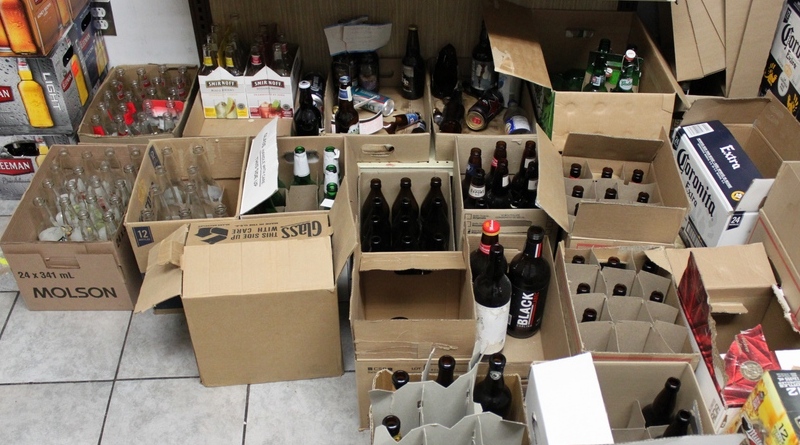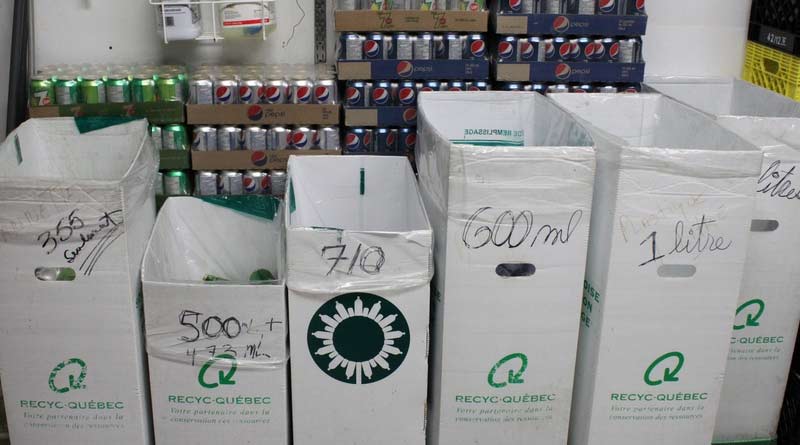Deposit-Refund Program: Quebec Wants A Reform This Fall
The modernization of the Quebec deposit-refund program is a debate that seemed to never end but enough is enough!… has just decided the Quebec government.
David Heurtel, the Quebec Environment Minister, announced a few days ago the creation of a committee bringing together key industry stakeholders to agree on a reform of the deposit-refund program.
His objective is to modernize the current 30-year system as soon as next Fall, a year prior to the already scheduled october 2018 election.
The stakes are gigantic and the system, very complex. It includes:
- Different types of containers: refillable containers (such as beer bottles) and non-refillable ones (such as soft drinks, juice, water, wine and liquor);
- Various materials: aluminum, plastic, glass (brown, green, clear, etc.);
- Different recovery methods: at the point-of-sale (where containers must be returned) or at home (where containers are just dropped in recycling bins that are emptied weekly by the participating municipalities).

The sheer number of stakeholders involved is staggering. It includes those who manufacture containers (glass, plastic and aluminum), those who put liquid in them (beer, juice, water, soft drink, energy drinks, wine, liquors), those who distribute and sell them to consumers (retailers), those who recover, recycle, transform and resuse them … in short, lots of groups with a lot at stake.
Now all these vested interests have more or less separated into two fiercely opposing camps:
- The DEPOSIT-REFUND PROGRAM CAMP includes the industry that purchases and reuses recycled materials since the deposit-refund system is believed to provide a higher quality product as well as environmentalists who deem the money incentive deposit-refund system best for keeping more recyclable materials out of the landfill;
- The CURBSIDE RECYCLING SERVICE CAMP, which includes retailers, recycling companies and container manufacturers that are already paying significantly for the existing system established all across the province and wish to limit long-term cost increases.
The SAQ (Société des alcools du Québec, the Quebec wine monopoly) for its part, hopes to retain its current privilege of being allowed to throw millions and millions of wine glass bottles in nature without having to pour a single drop of sweat to recover them.
The government is clearly leaning towards extending the deposit-refund program since, like environmentalists, it also wants to keep more recyclable materials out of the landfill. Except that in the years 2000, it is that same government that implemented the curbside recycling services throughout the province at great cost for the private sector. So that extending the deposit-refund system now would weaken the use and value of the blue recycle bin. And this, not to mention the effect on the whole chain of transformation that has developed downstream of the blue recycle bin and which relies on its recyclable material value to grow, invest and adopt new technology.
For convenience store owners, the stakes are high and their frustrations plenty since they are the ones who are basically carrying the deposit-refund program on their shoulders.
The deposit-refund system is indeed a real burden … as anyone can figure:
- It forces retailers to collect and remit the container deposit to their customers and account for it;
- It obliges to handle containers that are often filthy or filled with some disgusting stuff (insects, cigarette butts …);
- It requires the storage of containers by categories, which takes up a lot of backroom space;
- It requires to coordinate the delivery to the distributors … in short, a lot of work and costs for little or no benefits!

Convenience store owners divided on the issue
In a survey carried out in April 2015 by the firm Segma Recherche on behalf of the Quebec Convenience Store Association (QCSA), 544 convenience store owners and managers shared their thoughts on the issue.
- C-store owners say they spend an average of 7.2 hours per week taking care of the deposit-refund program. That’s about $ 95 a week, or $ 5,000 a year in salary;
- The majority, 45%, say they recover more bottles than they sell, compared with 26% who say they recover less;
- For more than one-third of convenience stores (36%), deposit-refund is a money-losing activity, while only 11% believe it is profitable;
- Good or bad? C-stores are divided: 48% say it is a problem, 45% that it attracts customers;
- However, the vast majority, 69%, are for its complete removal to the benefit of the curbside recycling services;
- Retailers would also like to see the current “cheap” compensation of 2 cents only per container that they get (and that has never been raised in 30 years) increased by 5 cents to a total of 7 cents per container.
Given the small size of convenience stores, it goes without saying that the costs incurred for managing the deposit-refund system are proportionally much higher for them than for supermarkets and other larger surface retailers.
Among the regulatory clutter in which convenience stores are drowning, the deposit-refund system stands out as being quite cumbersome. It is hoped that the upcoming reform will simplify operations and, above all, better share the burden between convenience stores and other types of retailer.
For now, the 6,500 convenience stores in Quebec do way more than their fair share and all this, for a miserable 2 cents per container that has never been adjusted for 30 years.
The government does not hesitate to adjust its permit fees every year! So why not do the same for the compensatory amount paid to convenience stores?






